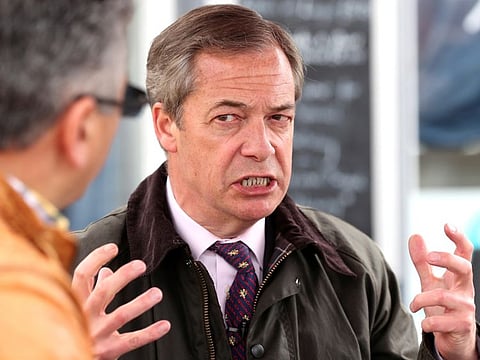On Brexit, the ground might be shifting
British politics in a state of flux with the Leave and Remain sides hoping for change

Here’s how we can halt Brexit in its tracks. Uefa, the governing body of European football, should announce that from now on participation in the Champions League and the Europa League will be limited to members of the European Union (EU). If Britain leaves the EU, the Premier League’s finest will be barred from taking part. The response would be immediate: support for Brexit would plummet, with the plunge most visible in Liverpool, Chelsea and concentrated parts of north London.
All right, maybe Uefa would be wary of appearing to punish the country that had just taken, without precedent and in thrilling fashion, all four spots in the finals of those two competitions. So here’s a more modest proposal. Why doesn’t Uefa announce that, if the UK leaves the single market and thereby abandons free movement of people, English clubs will be allowed to employ only a limited number of European players. Say two. Or one. Suddenly, a whole lot of one-time Brexiters would find themselves passionately making the case for a borderless Europe, arguing that the young and hungry should be free to move wherever their dreams and their talent might take them.
OK, maybe that’s also too much to ask. Perhaps football is not the perfect vehicle to make a popular, emotionally resonant case for remaining in the EU (though it helps). Nevertheless, last week has suggested a few ways that case might be made, and offered some encouraging signs that it’s already happening. Start with the Liberal Democrats and their “Bollocks to Brexit” slogan. I understand the response of many who found that a tad dispiriting, a small but marked coarsening of the public conversation. There was also something of the headmaster-in-jeans about it, as if Vince Cable, not a natural deployer of street language, was trying to keep up with the Carl Benjamins and Tommy Robinsons who have grabbed so much of the coverage during this European election campaign.
And yet, I suspect the Lib Dems have got it right. They’ve understood that in the current political marketplace it’s clarity that counts. Nigel Farage’s Brexit party is polling well because it’s obvious what it stands for. The Tories, not so much. As for Labour, its triangulation has become so tortured that it takes a full paragraph to explain its position on Brexit in a world where a single word is required: for or against.
Despite the fragmentation of the remain camp, there are signs that the cause itself is gaining ground. Along with the appalling fall in the UK GP numbers, last week saw figures showing a sharp drop in EU nurses and midwives working in the health service, with 5,000 quitting the NHS in the last two years. During the 2016 referendum, the NHS was brilliantly co-opted by the leave campaign as a weapon: If you truly back our health service, why not give it £350 million instead of showering that cash on those Brussels bureaucrats? That’s flipped: The NHS is a remain issue now. Nearly twice as many Britons think the NHS will get worse after Brexit than think it will get better.
‘The Farage paradox’
The very success of the Brexit party could end up boosting the pro-European camp. Analyst Sunder Katwala coined the term “the Farage paradox” several years ago, noting that when Farage was riding high, boosting Ukip’s vote share, the cause of leaving Europe declined in popularity. Farage was good at mobilising his base, but he repelled moderate voters in the process. One reason leave won in 2016 was that it successfully sidelined Farage, putting Boris Johnson and Michael Gove out front instead. If Farage is once again becoming the face of Brexit — and, right now, he is — that could hurt Brexit as much as it helps.
Indeed, there might be a more localised version of the Farage paradox at work in the electorate that still matters most for the fate of Brexit: MPs. Some Tory MPs will react to Farage’s success by panicking, rushing to embrace a no-deal crash-out from the EU to save their seats from a surging Brexit party. But others will be alarmed by that prospect and all it entails: the likelihood of a Johnson or Dominic Raab succeeding Theresa May as Tory leader and an early general election. Compared with that mayhem, submitting to a public vote will come to seem the least bad option. .
The ground might just be shifting on Brexit. The polls are saying it, with a steady and sustained lead for remain over leave. The cause of remain was counted out, but if there’s one thing last week has shown — when it comes to a high-stakes fight for staying in Europe, even the most dramatic comebacks are possible.
— Guardian News & Media Ltd
Jonathan Freedland is a leading British political columnist.



